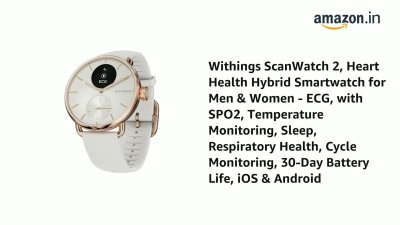Withings ScanWatch 2 Gets Predictive AI Health Boost with HealthSense 4 Update
By: @devadigax

Withings, the French digital health company known for its blend of sleek design and advanced health tracking technology, has unveiled a significant upgrade to its ScanWatch 2 smartwatch. At IFA 2025, the company announced HealthSense 4, a major operating system update that introduces powerful predictive AI capabilities alongside enhanced health monitoring features. This update promises to transform the ScanWatch 2 from a passive health tracker into a proactive health guardian, alerting users to potential health issues before they become serious.
The core of the HealthSense 4 update is the integration of sophisticated AI algorithms. These algorithms analyze data collected from the ScanWatch 2's various sensors, including its ECG and SpO2 monitors, to identify subtle patterns and deviations from a user's established baseline health metrics. This allows for the generation of predictive alerts, notifying users of potential irregularities that might otherwise go unnoticed. While Withings hasn't detailed the specifics of every algorithm, the company emphasizes the proactive nature of these alerts, giving users valuable time to seek medical attention if necessary.
This predictive capability extends to a broad range of health metrics, with Withings claiming the inclusion of algorithms for 35 different health indicators. While the exact list remains undisclosed, we can anticipate that it covers many of the features already present in the ScanWatch 2, such as heart rate variability (HRV), sleep patterns, respiration rate, and blood oxygen saturation. The update likely also leverages improved algorithms for existing features, potentially providing more accurate and nuanced insights into user health. The improved accuracy and expanded predictive capabilities signal a notable step forward in the capabilities of wearable health technology.
The expansion to 35 health metrics represents a significant jump from previous versions. This suggests a more holistic approach to health monitoring, potentially incorporating less-common metrics that may indicate early signs of health issues. This could include metrics related to stress levels, hydration, or even subtle variations in gait that might indicate neurological problems. The wider range of data points available to the AI algorithms allows for a more comprehensive assessment of a user's overall health status.
HealthSense 4 also promises improvements in the user experience. While details remain scarce, it's likely the update will feature a refined user interface, making navigation easier and data visualization more intuitive. Withings is known for its commitment to user-friendly design, and this aspect of the update will be crucial in ensuring the effectiveness of the advanced health monitoring features. Easier access to detailed data will empower users to better understand their health and engage more proactively with their wellbeing.
The introduction of predictive AI in consumer-grade wearable technology is a significant development in the rapidly evolving field of digital health. It reflects a broader trend towards personalized and proactive healthcare solutions. By leveraging the power of AI, Withings is moving beyond simply tracking health data to actively predicting potential health problems, empowering users to take preventative measures and work closely with their healthcare providers.
The competitive landscape of the smartwatch market is intensely crowded. Companies like Apple, Samsung, and Fitbit have already established significant market shares with their own health-tracking devices. However, Withings has carved a niche for itself by focusing on medical-grade accuracy and integration with healthcare professionals. The HealthSense 4 update further solidifies this position by pushing the boundaries of what's possible with wearable AI-powered health monitoring. The ability to predict potential health issues offers a powerful advantage, placing the ScanWatch 2 as a serious contender in the increasingly sophisticated world of digital health. Further details on pricing and availability will be eagerly awaited by consumers and industry analysts alike. The future of health monitoring, it seems, is increasingly intertwined with the predictive power of AI.
The core of the HealthSense 4 update is the integration of sophisticated AI algorithms. These algorithms analyze data collected from the ScanWatch 2's various sensors, including its ECG and SpO2 monitors, to identify subtle patterns and deviations from a user's established baseline health metrics. This allows for the generation of predictive alerts, notifying users of potential irregularities that might otherwise go unnoticed. While Withings hasn't detailed the specifics of every algorithm, the company emphasizes the proactive nature of these alerts, giving users valuable time to seek medical attention if necessary.
This predictive capability extends to a broad range of health metrics, with Withings claiming the inclusion of algorithms for 35 different health indicators. While the exact list remains undisclosed, we can anticipate that it covers many of the features already present in the ScanWatch 2, such as heart rate variability (HRV), sleep patterns, respiration rate, and blood oxygen saturation. The update likely also leverages improved algorithms for existing features, potentially providing more accurate and nuanced insights into user health. The improved accuracy and expanded predictive capabilities signal a notable step forward in the capabilities of wearable health technology.
The expansion to 35 health metrics represents a significant jump from previous versions. This suggests a more holistic approach to health monitoring, potentially incorporating less-common metrics that may indicate early signs of health issues. This could include metrics related to stress levels, hydration, or even subtle variations in gait that might indicate neurological problems. The wider range of data points available to the AI algorithms allows for a more comprehensive assessment of a user's overall health status.
HealthSense 4 also promises improvements in the user experience. While details remain scarce, it's likely the update will feature a refined user interface, making navigation easier and data visualization more intuitive. Withings is known for its commitment to user-friendly design, and this aspect of the update will be crucial in ensuring the effectiveness of the advanced health monitoring features. Easier access to detailed data will empower users to better understand their health and engage more proactively with their wellbeing.
The introduction of predictive AI in consumer-grade wearable technology is a significant development in the rapidly evolving field of digital health. It reflects a broader trend towards personalized and proactive healthcare solutions. By leveraging the power of AI, Withings is moving beyond simply tracking health data to actively predicting potential health problems, empowering users to take preventative measures and work closely with their healthcare providers.
The competitive landscape of the smartwatch market is intensely crowded. Companies like Apple, Samsung, and Fitbit have already established significant market shares with their own health-tracking devices. However, Withings has carved a niche for itself by focusing on medical-grade accuracy and integration with healthcare professionals. The HealthSense 4 update further solidifies this position by pushing the boundaries of what's possible with wearable AI-powered health monitoring. The ability to predict potential health issues offers a powerful advantage, placing the ScanWatch 2 as a serious contender in the increasingly sophisticated world of digital health. Further details on pricing and availability will be eagerly awaited by consumers and industry analysts alike. The future of health monitoring, it seems, is increasingly intertwined with the predictive power of AI.
Comments
Related News

OpenAI Unveils ChatGPT Atlas: Your Browser Just Became Your Smartest AI Assistant
In a move poised to fundamentally reshape how we interact with the internet, OpenAI has officially launched ChatGPT Atlas, a gr...
@devadigax | 22 Oct 2025
In a move poised to fundamentally reshape how we interact with the internet, OpenAI has officially launched ChatGPT Atlas, a gr...
@devadigax | 22 Oct 2025

Netflix Doubles Down on Generative AI, Challenging Hollywood's Divide Over Creative Futures
In a move that underscores a growing chasm within the entertainment industry, streaming giant Netflix is reportedly going "all ...
@devadigax | 21 Oct 2025
In a move that underscores a growing chasm within the entertainment industry, streaming giant Netflix is reportedly going "all ...
@devadigax | 21 Oct 2025

AI Agent Pioneer LangChain Achieves Unicorn Status with $1.25 Billion Valuation
LangChain, the innovative open-source framework at the forefront of building AI agents, has officially joined the exclusive clu...
@devadigax | 21 Oct 2025
LangChain, the innovative open-source framework at the forefront of building AI agents, has officially joined the exclusive clu...
@devadigax | 21 Oct 2025

Meta Boots ChatGPT From WhatsApp: A Strategic Play for AI Dominance and Walled Gardens
In a significant move that reshapes the landscape of AI chatbot accessibility, OpenAI has officially confirmed that its popular...
@devadigax | 21 Oct 2025
In a significant move that reshapes the landscape of AI chatbot accessibility, OpenAI has officially confirmed that its popular...
@devadigax | 21 Oct 2025

Meta's New AI Peeks Into Your Camera Roll: The 'Shareworthy' Feature Raises Privacy Eyebrows
Meta, the parent company of Facebook, has rolled out a new, somewhat controversial artificial intelligence feature to its users...
@devadigax | 18 Oct 2025
Meta, the parent company of Facebook, has rolled out a new, somewhat controversial artificial intelligence feature to its users...
@devadigax | 18 Oct 2025
 AI Tool Buzz
AI Tool Buzz